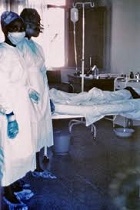Air and Ocean Freight Carriers Warned of Ebola Transmission

Trio of Industry Representative Bodies Warn of Dire Consequences if Steps Are Not Taken.
WORLDWIDE – Three global shipping organisations have issued a joint advisory note aimed at guiding its members on the risks posed to merchant ships’ crew in countries affected by the ever growing and worrisome Ebola virus. This outbreak has claimed nearly 900 lives and centres on countries in western Africa, mainly Guinea, Liberia, and Sierra Leone, with increasing reports from Nigeria and both air and ocean freight carriers need to be aware of all aspects of the disease.
The International Chamber of Shipping (ICS), International Maritime Employers’ Council (IMEC), and the International Transport Workers’ Federation (ITF) urges the Masters and crew of vessels calling at ports in the countries affected to ensure that they are aware of the risks of the virus, how it can be spread and how to reduce the risk. Careful consideration should be made before taking shore leave in infected regions and crew should be aware of the symptoms and reporting procedures if signs become apparent.
The Ebola virus disease (EVD), formerly known as Ebola haemorrhagic fever, is a severe, often fatal illness in humans with a case fatality rate of up to 90%. It is important to note that the virus is not generally known to be airborne and is transmitted to people from wild animals and spreads in the human population through human-to-human transmission with infection resulting from direct contact (through broken skin or mucous membranes) with the blood, secretions, organs or other bodily fluids of infected people, and indirect contact with environments contaminated with such fluids.
The illness is often characterised by the sudden onset of fever, intense weakness, muscle pain, headache and sore throat. This is followed by vomiting, diarrhoea, rash, impaired kidney and liver function, and in some cases, both internal and external bleeding. Any cases of persons who are suspected to have the disease should be reported to the nearest health unit without delay. Prompt medical care is essential to improving the rate of survival from the disease and it is also important to control spread of the disease and infection control procedures need to be started immediately.

The joint advisory note also warns that ISPS code requirements ensuring that unauthorised personnel do not board should be strictly enforced throughout the duration of the vessel being in port, adding that the shipowner/operator should avoid making crew changes in the ports of an affected country and after departure, the crew should be aware of the symptoms and report any occurring symptoms immediately to the person in charge of medical care. A spokesperson for the three organisations commented:
“Everyone is deeply concerned for those suffering from the Ebola epidemic and supportive of a coordinated world response to help them. We particularly applaud all those medical staff who are risking their lives to help. In the meantime we want to make sure that those in the world shipping industry play our part in ensuring the safety of crews visiting the affected countries, and minimising the risk of the virus spreading further.”
With passenger flight into and from Sierra Leone and Nigeria being suspended by a growing portfolio of air carriers such as Emirates and now British Airways nobody should underestimate the seriousness of the situation.
Further information and avoidance procedures regarding the recent Ebola outbreak can be found HERE.
Click here for related article on OnboardOnline
*Original story: Handy Shipping Guide via Google News (search term: shipping)
*Image credit: Wikimedia Flickr/AJ Cann![]()

Post your comment
You cannot post comments until you have logged in.
Login to post a commentComments
No one has commented on this page yet.
RSS feed for comments on this page | RSS feed for all comments